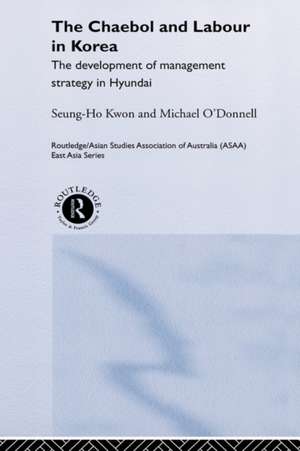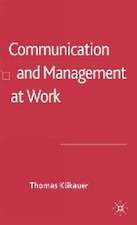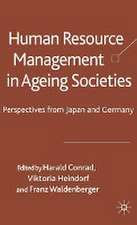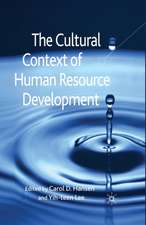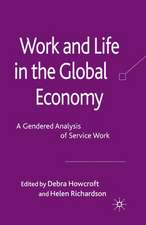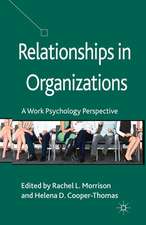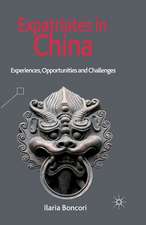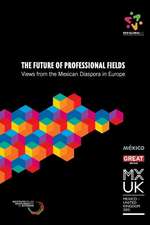The Cheabol and Labour in Korea: The Development of Management Strategy in Hyundai: Routledge/Asian Studies Association of Australia (ASAA) East Asian Series
Autor Seung Ho Kwon, Michael O'Donnellen Limba Engleză Hardback – 26 apr 2001
Din seria Routledge/Asian Studies Association of Australia (ASAA) East Asian Series
- 8%
 Preț: 390.34 lei
Preț: 390.34 lei -
 Preț: 319.01 lei
Preț: 319.01 lei -
 Preț: 318.39 lei
Preț: 318.39 lei -
 Preț: 483.33 lei
Preț: 483.33 lei -
 Preț: 488.12 lei
Preț: 488.12 lei -
 Preț: 412.19 lei
Preț: 412.19 lei -
 Preț: 414.39 lei
Preț: 414.39 lei -
 Preț: 483.55 lei
Preț: 483.55 lei -
 Preț: 416.22 lei
Preț: 416.22 lei -
 Preț: 410.07 lei
Preț: 410.07 lei -
 Preț: 381.39 lei
Preț: 381.39 lei -
 Preț: 474.14 lei
Preț: 474.14 lei -
 Preț: 463.19 lei
Preț: 463.19 lei -
 Preț: 406.59 lei
Preț: 406.59 lei - 17%
 Preț: 259.51 lei
Preț: 259.51 lei -
 Preț: 386.39 lei
Preț: 386.39 lei - 18%
 Preț: 1005.80 lei
Preț: 1005.80 lei - 18%
 Preț: 1388.31 lei
Preț: 1388.31 lei -
 Preț: 366.85 lei
Preț: 366.85 lei - 18%
 Preț: 1002.02 lei
Preț: 1002.02 lei
Preț: 1056.80 lei
Preț vechi: 1288.79 lei
-18% Nou
Puncte Express: 1585
Preț estimativ în valută:
202.21€ • 211.70$ • 167.32£
202.21€ • 211.70$ • 167.32£
Carte tipărită la comandă
Livrare economică 07-21 aprilie
Preluare comenzi: 021 569.72.76
Specificații
ISBN-13: 9780415221696
ISBN-10: 0415221692
Pagini: 240
Dimensiuni: 156 x 234 x 14 mm
Greutate: 0.51 kg
Ediția:1
Editura: Taylor & Francis
Colecția Routledge
Seria Routledge/Asian Studies Association of Australia (ASAA) East Asian Series
Locul publicării:Oxford, United Kingdom
ISBN-10: 0415221692
Pagini: 240
Dimensiuni: 156 x 234 x 14 mm
Greutate: 0.51 kg
Ediția:1
Editura: Taylor & Francis
Colecția Routledge
Seria Routledge/Asian Studies Association of Australia (ASAA) East Asian Series
Locul publicării:Oxford, United Kingdom
Public țintă
PostgraduateCuprins
Introduction I The Political Economy of South Korea 1. The state, the chaebol and independent trade unions II Family Business and Expansion: 1940-1960s 2. Towards formalisation of labour management in Hyundai III Business Diversity and Concentration: 1970s-Early 1980s3. The organisation of work in heavy industries 4. A dual approach to personnel management and labour resistance IV Crisis and Transition: Early 1980s-1990s 5. The re-emergence of independent trade unions 6. Decentralisation of heavy industries 7. The extension of paternalism and union-avoidance 8. Conclusion
Notă biografică
Seung Ho Kwon, Michael O'Donnell
Descriere
Focusing on the labour management strategies of the Hyundai Business Group, this important new study argues that historical analysis is essential for a complete understanding of the dynamics of South Korean industrial relations.
